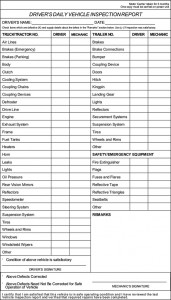Effective January 30, 2015, all drivers with a commercial driver’s license (CDL) must have a current medical certification registered with the Texas Driver’s License Agency, Department of Motor Vehicles Division. That includes oilfield drivers working in the Eagle Ford Shale.
Original Deadline was January 30, 2014, and that has been extended to January 30, 2015
Download the Texas CDL Self-Certification Affidavit HERE
All CDL holders must provide information to their state driver’s license agency (SDLA) regarding the type of commercial motor vehicle operation they drive in or expect to drive in with their CDL. Drivers operating in certain types of commerce will be required to submit a current medical examiner’s certificate to their SDLA to obtain a “certified” medical status as part of their driving record. CDL holders required to have a ”certified” medical status who fail to provide and keep up-to-date their medical examiner’s certificate with their SDLA will become ”not-certified” and they may lose their CDL.
It is the drivers’ responsibility to keep their medical certification up to date. Drivers who do not submit a medical certification prior to it expiring will find that their CDL license will be downgraded to a non CDL license. They’ll lose their commercial motor vehicle operation privileges. In order to regain the CDL a driver will have to complete all written and skills tests all over again.
While registering the certificate is the responsibility of the individual driver, employers have a stake in the matter. They stand to lose valuable drivers who fail to comply with the regulation. So it’s in the employers’ interest to inform their drivers of the requirement. Follow up and make sure all commercial motor vehicle drivers have taken steps to keep their CDL in force.
Each state is handling the matter of medical certificates differently. For specific state-by-state requirements for drivers and information related to how a state is handling the Medical Certification requirements, and to determine whom to contact for additional information, click on the following link: http://www.aamva.org/aamva/DocumentDisplay.aspx?id={687D99D3-FFB5-4B76-BD6F-F5EF54728BE0
A Case Study
John Rojas, Education Specialist for Mike Byrnes and Assoc., Inc., relates his experience:
I personally renewed my CDL license at the local DMV in Corpus Christi. Fortunately I scheduled my visit perfectly because I was in and out of there in about 30 minutes. I had to complete a self-certification affidavit (CDL-7 form). The form is pretty simple to fill out and all you have to do is check what type commerce you operate in. This form will determine your eligibility to operate a commercial vehicle with or without a current medical certificate.
Since I renewed my license at my local DMV they relayed my information to the enforcement and compliance service for me.
How Eagle Ford Drivers Can Self-Certify
Self-certify by completing a CDL-7 form. You can do this via the Internet. Go to www.dps.texas.gov/driverlicense. Complete the form online and save it in PDF format. Then email that PDF to CDLMedCert@dps.texas.gov.
Need help deciding the type of commerce in which you plan to operate? Read the information for DOT medical certification requirements that you’ll find at http://www.txdps.state.tx.us/DriverLicense/medCertReq.htm .
You can also print out the CDL-7 form and mail it to:
Texas Department of Public Safety Enforcement and Compliance Service
Attn: CDL Section P.O. Box 4087 Austin, TX 78773-0320 Or you can fax it to 512-424-2002.
Depending on what type of commercial driving you do you may also need to get a medical examiner’s certificate. (All but one of the four Categories require one.) If your driver’s license is current but you have not submitted a copy of your current medical card to the enforcement and compliance service you can submit it yourself. Send a copy of your medical card by mail or fax, or email it. Note that documents submitted by email must be in PDF format, so you may need to scan that medical certificate and save it as a PDF.


